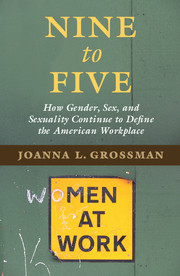Book contents
- Frontmatter
- Dedication
- Contents
- Foreword
- Acknowledgments
- Introduction
- PART I WHAT IS SEX DISCRIMINATION?
- PART II SEXUAL HARASSMENT
- PART III PREGNANT WOMEN AND MOTHERS AT WORK
- 31 Pregnant Truckers and the Problem of Light-Duty Assignments
- 32 A Big Win for Pregnant Police Officers
- 33 Undue Burden
- 34 Hard Labor: New Pregnancy Discrimination Guidance from the EEOC
- 35 Forceps Delivery: The Supreme Court Narrowly Saves the Pregnancy Discrimination Act in Young vs. UPS
- 36 The Pregnancy Discrimination Act Reaches Advanced Maternal Age
- 37 The Pregnant Workers’ Fairness Act: A Time for Change?
- 38 The Supreme Court Deals a Blow to Once-Pregnant Retirees
- 39 If She Does Not Win It Is a Shame
- 40 Must Employers Who Cover Prescriptions Cover Contraception?
- 41 Fertile Ground for Discrimination
- 42 Can a Woman Be Fired for Absenteeism Related to Fertility Treatments?
- 43 Is Lactation Related to Pregnancy?
- 44 A Victory for Families, but Hardly a Panacea
- 45 A Small Step in the Right Direction: The Family and Medical Leave Act at Twenty
- 46 “Best Practices” to Promote Work-Family Balance
- PART IV FEMALE BREADWINNERS AND THE GLASS CEILING
- Conclusion
- Notes
- Index
35 - Forceps Delivery: The Supreme Court Narrowly Saves the Pregnancy Discrimination Act in Young vs. UPS
from PART III - PREGNANT WOMEN AND MOTHERS AT WORK
Published online by Cambridge University Press: 05 May 2016
- Frontmatter
- Dedication
- Contents
- Foreword
- Acknowledgments
- Introduction
- PART I WHAT IS SEX DISCRIMINATION?
- PART II SEXUAL HARASSMENT
- PART III PREGNANT WOMEN AND MOTHERS AT WORK
- 31 Pregnant Truckers and the Problem of Light-Duty Assignments
- 32 A Big Win for Pregnant Police Officers
- 33 Undue Burden
- 34 Hard Labor: New Pregnancy Discrimination Guidance from the EEOC
- 35 Forceps Delivery: The Supreme Court Narrowly Saves the Pregnancy Discrimination Act in Young vs. UPS
- 36 The Pregnancy Discrimination Act Reaches Advanced Maternal Age
- 37 The Pregnant Workers’ Fairness Act: A Time for Change?
- 38 The Supreme Court Deals a Blow to Once-Pregnant Retirees
- 39 If She Does Not Win It Is a Shame
- 40 Must Employers Who Cover Prescriptions Cover Contraception?
- 41 Fertile Ground for Discrimination
- 42 Can a Woman Be Fired for Absenteeism Related to Fertility Treatments?
- 43 Is Lactation Related to Pregnancy?
- 44 A Victory for Families, but Hardly a Panacea
- 45 A Small Step in the Right Direction: The Family and Medical Leave Act at Twenty
- 46 “Best Practices” to Promote Work-Family Balance
- PART IV FEMALE BREADWINNERS AND THE GLASS CEILING
- Conclusion
- Notes
- Index
Summary
By a vote of 6–3, the Supreme Court ruled in favor of Peggy Young, a UPS driver who claimed she was illegally discriminated against when she was denied a workplace accommodation that was made available to other employees with similar physical restrictions. In an opinion by Justice Breyer, the Court concluded that her case should not have been dismissed on summary judgment; rather, she should have had the opportunity to prove that UPS, by refusing her an accommodation it made available to many other restricted workers, committed pregnancy discrimination. Justice Alito agreed that UPS's victory on summary judgment should be vacated and the case remanded, but based on a different interpretation of applicable law.
This ruling caps off more than a decade of controversial litigation over the application of the Pregnancy Discrimination Act to accommodation claims. And while the Court's reasoning raises many questions, the holding restores protection that pregnant workers should have had by statute but that they have been denied by many federal courts.
HARD LABOR: PEGGY YOUNG AND UPS'S LIGHT-DUTY POLICY
When Peggy Young finally became pregnant after a series of miscarriages, her doctor imposed a restriction on how much she could lift. At the time, she worked as an “air driver” for UPS, a delivery driver who carried lighter letters and packs for United Parcel Service that had arrived by air. UPS decided that it could not continue to allow her to work unless she could lift the amount listed in her job description, even though she rarely if ever was asked to lift things that heavy. She requested a light-duty assignment but was denied, despite the fact that UPS made such accommodations available to three large groups of employees; those who were injured on the job, those who were eligible for an accommodation under the Americans with Disabilities Act, and those who had lost their commercial driver's licenses because of a medical condition such as a diabetic complication or a legal condition such as the loss of a license after a drunk driving conviction. Young, however, was denied a similar accommodation. She was forced out of her job, lost her health insurance, and was allowed to return to work only after giving birth.
- Type
- Chapter
- Information
- Nine to FiveHow Gender, Sex, and Sexuality Continue to Define the American Workplace, pp. 208 - 215Publisher: Cambridge University PressPrint publication year: 2016



